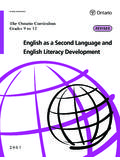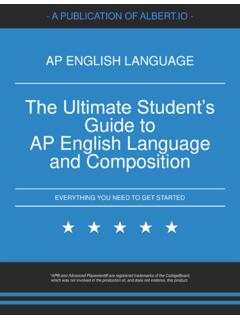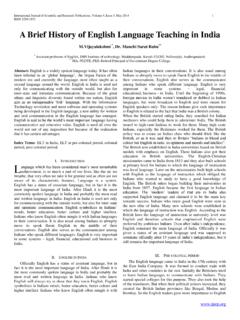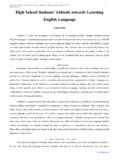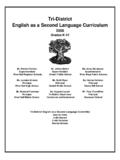Transcription of English Language Performance and Difficulties of Pupils in ...
1 106 English Language Performance and Difficulties of Pupils in the Mother Tongue based (MTB) Medium of Instruction Wilbert Giuseppe L. De Guzman Pangasinan State University School of Advanced Studies Presley V. De Vera Pangasinan State University School of Advanced Studies Abstract This study that adopts descriptive and inferential research methods investigated the status of elementary grade Pupils English proficiency, particularly the Grades 1, 2 and 3 Pupils who are simultaneously taking up subjects in the Mother Tongue and English that are integrated in their curricula. The research population was sourced from a single research locale, Don Amadeo Perez Sr.
2 Memorial Central School-Main, during the SY 2017-2018. The study employed content-validated data-gathering instruments. The Pupils across the three curriculum grades have varied socio-demographic and Language -learning characteristics. Sex-distribution in the three grade levels have different ratios. Regardless of curriculum grade designation, the Pupils mother tongues range from Ilokano , Tagalog , and English . The family income of all the Pupils regardless of curriculum grade are differentiated and range from Very High , High , Above Average , Average , Low , and Very Low . Across the three grade levels, the Pupils academic Performance in English registered into different levels from Outstanding (maximum) to Fairly Satisfactory (minimum).
3 Most of the Pupils in each group registered densely in the lower strata of Performance levels. Their academic Performance in Mother Tongue registered in the levels of Outstanding (maximum) to Fairly Satisfactory (minimum). Grades 1, 2, and 3 Pupils English proficiency levels range from High (maximum) to Low (minimum). Relationship between the profile variables and English proficiency is dependent on the grade level of students. None of the profile variables are significantly related to EPL in the accounts of the Grade 2 Pupils . Grade 1 Pupils account for a significance in relationship between academic Performance in mother tongue and EPL.
4 Grade 3 Pupils account for a significance in relationship between EPL and sex , academic Performance in Mother Tongue and academic Performance in English . Teachers vary as to their level of agreement or disagreement on the positive 107 or negative implications of the MTB-MLE policy in the English proficiency of Pupils . Based on the aforementioned gist of research findings, several recommendations were offered to improve instructional efficiency and strategies that can alleviate Pupils Difficulties and limitations in their English proficiency as well as their academic Performance in English subjects. This shall be done adjacently as they are also expected to equally develop linguistic skills in their Mother Tongue.
5 These involve the initiative and cooperation among the concerned English Language and Mother Tongue teachers, the School management, and the Pupils . Recommendations were also addressed for future researchers to continue their scholarly investigation on the effects or implications of the adjacent learning of Mother Tongue and English prescribed by the MTB-MLE policy of the Department of Education (DepEd). Keywords: English Language Performance , English Proficiency, Mother Tongue-Based (MTB), MTB-MLE Introduction The Philippines as a multilingual country has a different scene setting when it comes to the institutionalization of a national policy requiring mother tongue-based multilingual education (MTB-MLE) in the primary school years (Burton, 2013).
6 With regards to such implementation, many studies have long supported the use of mother tongue as the Language of instruction. However, these researches have primarily been conducted in the community rather than national settings. In Southeast Asia, a rising number of educational programs encourages a mother tongue approach in teaching and learning different core areas. Cambodia, Indonesia, Malaysia, Thailand, Timor L Este and Vietnam are among the countries in the region which adhere to the emerging Language -in-education policy (UNESCO, 2007). In line with this, the programs are being utilized at the community level with support from international non-governmental agencies.
7 While the use of non-dominant languages in education is allowed in each of these countries, the Philippines is the single country to institute a national policy requiring their inclusion in the early grades. It was 2009 when the Department of Education (DepEd) challenged the Bilingual Education Policy through the issuance of an order requiring different educational institutions to implement mother tongue-based multilingual education or MTB-MLE for brevity (Department Order No. 28, s. 2013). This order requires the first Language of the learners to be used as the medium of instruction in all subject areas from pre-kindergarten through grade three with Filipino and English 108 being taught as separate subjects (Department Order No.)
8 74, s. 2009). In 2012, another order was issued that offered more specific guidelines for MTB-MLE and embedded the reform in the newly adopted K to 12 Basic Education Program (Department Order No. 16, s. 2012). This order shifted from the original mother tongue approach by specifying twelve major regional languages or lingua franca to be used as the languages of instruction and offered as a learning area. Under this order, teachers are provided government-issued materials in their regional languages but are expected to adapt them to reflect the students first languages. Until recently, the MTB-MLE policy resided solely within DepEd. Finally, in January 2013, Congress officially supported this effort by passing the Enhanced Basic Education Act.
9 In addition to shifting toward a K to 12 educational structure, this legislation becomes as prerequisites in instruction, teaching materials, and assessments of the learners, considering further their regional and native languages as an accessory to learning from kindergarten through grade three with a mother Language transition program from grades four through six. Gradual implementation started with grade one students in 2012, followed by grades two and three in 2013 and 2014 respectively. This shift in Language policy is part of a growing number of trends around the world which support mother tongue instruction in the early years of a child s education.
10 As a result, the implementation of MTB-MLE in the Philippines is being looked at as an example for the rest of the region. The adoption of MTB-MLE became the beginning of a bigger movement for the DepEd and Congress that solely relies on the findings of various and previous studies that elucidate the benefits of mother tongue as a Language of instruction (Burton, 2013). These studies deduced that minority Language Pupils who gained literacy in their first Language or mother tongue experienced higher academic achievement than students who learned in a second or third Language . They suggested that second and third languages can be acquired more easily if a foundation in the first Language is established early.










